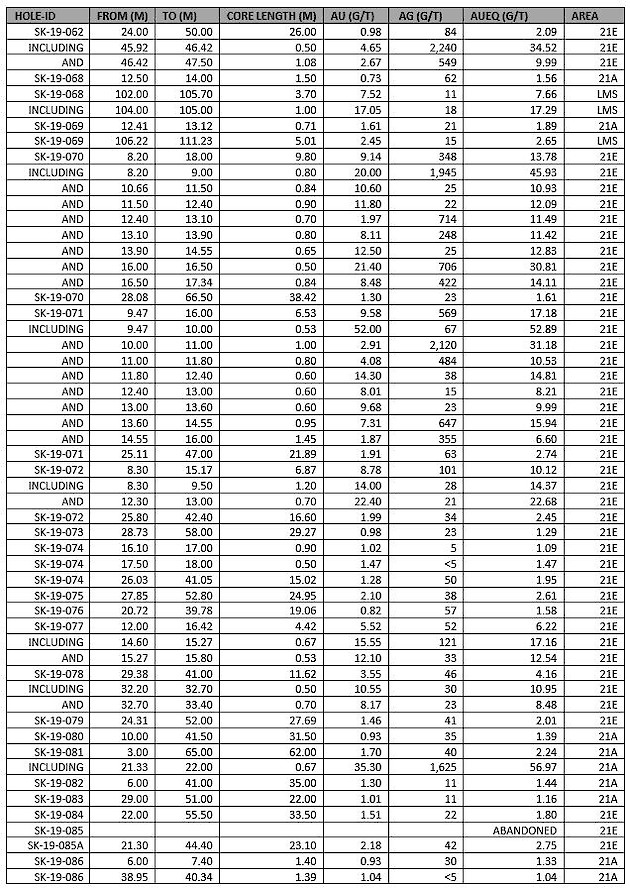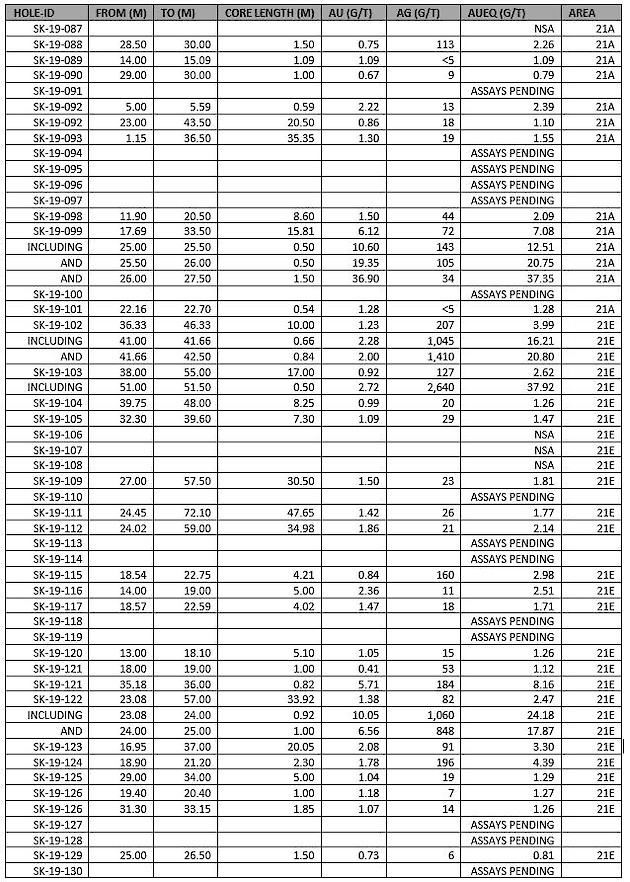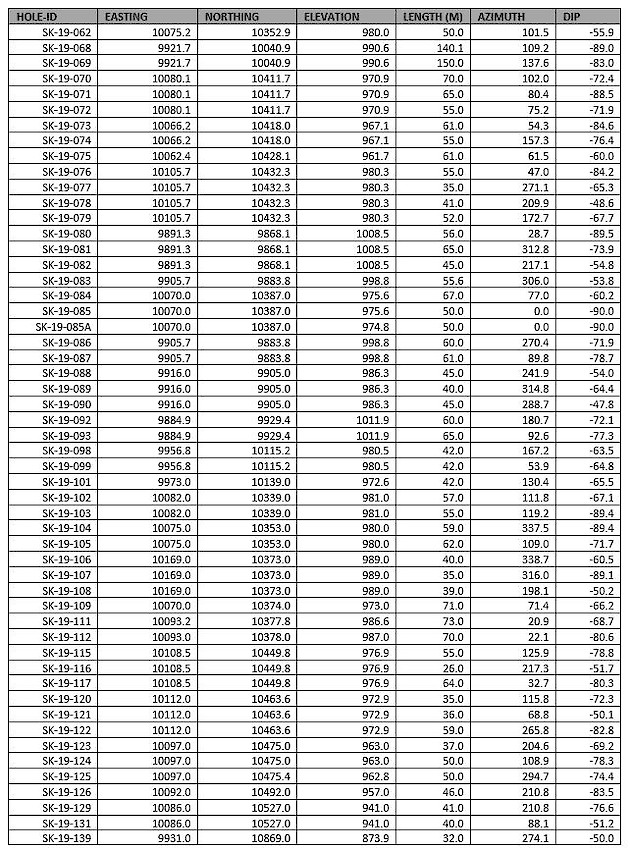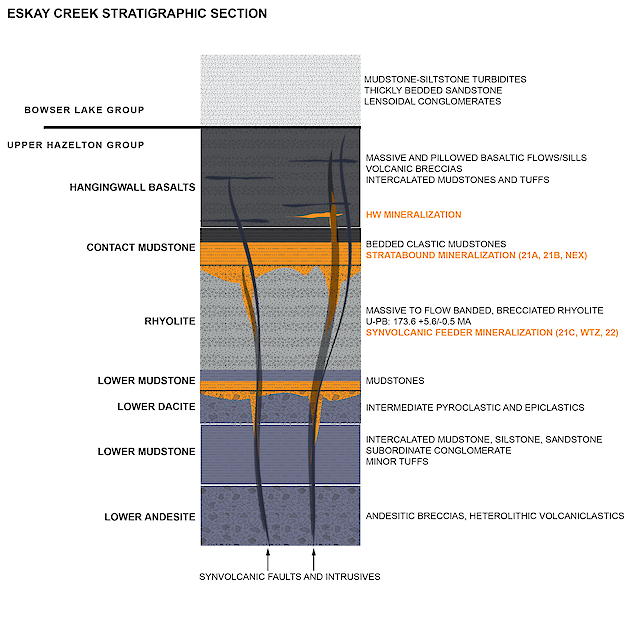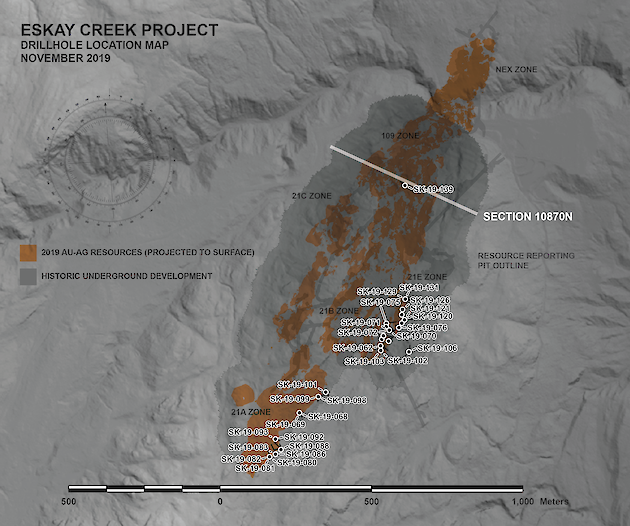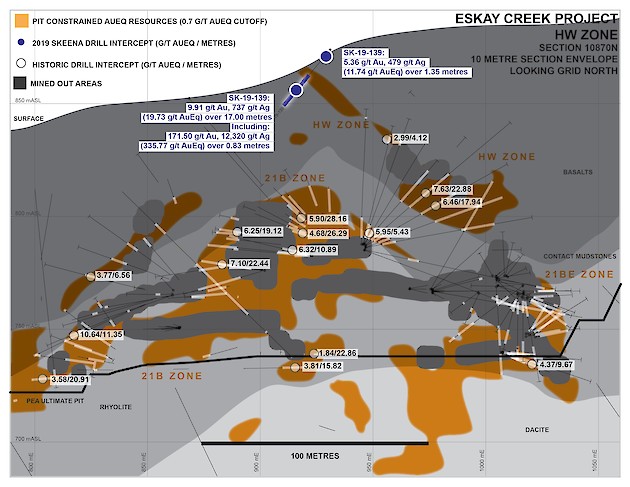Vancouver, BC (November 21, 2019) Skeena Resources Limited (TSX.V: SKE, OTCQX: SKREF) (“Skeena” or the “Company”) is pleased to announce additional gold-silver drill results from the ongoing Phase I surface drilling program at the Eskay Creek Project (“Eskay Creek”) located in the Golden Triangle of British Columbia. Three surface drill rigs are being used for the 2019 Phase I program in the 21A, 21E and HW Zones to infill and upgrade areas of Inferred resources to the Indicated classification. Drill hole results reported in this release are from the 21A, 21E and HW Zones and the new Lower Mudstone horizon. Reference images are presented at the end of this release as well as on the Company’s website.
Phase I Eskay Creek Drilling Highlights
- 9.14 g/t Au, 348 g/t Ag (13.78 g/t AuEq) over 9.80 metres (SK-19-070)
- Including: 21.40 g/t Au, 706 g/t Ag (30.81 g/t AuEq) over 0.50 metres
- 6.12 g/t Au, 72 g/t Ag (7.08 g/t AuEq) over 15.81 metres (SK-19-099)
- Including: 36.90 g/t Au, 34 g/t Ag (37.35 g/t AuEq) over 1.50 metres
- 9.91 g/t Au, 737 g/t Ag (19.73 g/t AuEq) over 17.00 metres (SK-19-139)
- Including: 171.50 g/t Au, 12,320 g/t Ag (335.77 g/t AuEq) over 0.83 metres
Gold Equivalent (AuEq) calculated via the formula: Au (g/t) + [Ag (g/t) / 75]. Reported core lengths represent 80-100% of true widths and are supported by well-defined mineralization geometries derived from historical drilling. Grade capping of individual assays has not been applied to the Au and Ag assays informing the length weighted AuEq composites. Processing recoveries have not been applied to the AuEq calculation and are disclosed at 100%. Samples below detection limit were nulled to a value of zero.
Initial HW Zone Drilling Intersects Broad High-Grade Mineralization
The first Phase I drill hole into the Hanging Wall (HW) Zone (SK-19-139), intersected a wider than predicted interval grading 9.91 g/t Au, 737 g/t Ag (19.73 g/t AuEq) over 17 m that has expanded the originally projected inferred mineralization. This also included a subinterval containing abundant visible gold and electrum grading 171.50 g/t Au, 12,320 g/t Ag (335.77 g/t AuEq) over 0.83 m. The HW Zone occurs approximately 20 m stratigraphically above the Contact Mudstone which was host to the 21B Zone deposits at Eskay Creek. Precious metal mineralization in this near surface HW Zone is uncommon at Eskay Creek, which is usually characterized by elevated base metals (Cu-Pb-Zn). The HW Zone is believed to represent a reactivated synvolcanic fault which crosscuts the andesitic cap rocks of the Eskay stratigraphy (refer to attached stratigraphic section).
Lower Mudstone Horizon Continues to Develop
Continued drill testing of the Lower Mudstone unit has again intersected additional mineralization below the 21A Zone. Drill hole SK-19-068 intersected a wide interval of Lower Mudstone with mineralization averaging 7.52 g/t Au, 11 g/t Ag (7.66 g/t AuEq) over 3.70 m including 17.05 g/t Au, 18 g/t Ag (17.29 g/t AuEq) over 1.00 m. This interval occurs approximately 30 m north of previously reported drill hole SK-19-063, which averaged 312.81 g/t Au, 95 g/t Ag (314.07 g/t AuEq) over 2.21 m including an individual sample with considerable visible gold grading 1,380 g/t Au, 322 g/t Ag (1,384.29 g/t AuEq) over 0.50 m.
A portion of the 21A Zone infill drill holes have been extended below the resources to test the exploration potential of this secondary and less explored mineralized mudstone horizon. The Lower Mudstone is situated approximately 100 m stratigraphically below the more familiar Contact Mudstone, host to the previously developed Eskay Creek deposits (see attached sections).
The Lower Mudstone is regionally extensive and averages 5 to 15 m in true thickness. It’s situated approximately 100 metres below the Eskay Creek deposits and has been traced by historical drilling for over 5,000 m along strike. Typical of bimodal volcanic sequences hosting Volcanic Hosted Massive Sulphide (VHMS) deposits, the mudstone represents a period of mineralizing and sedimentation quiescence between the underlying volcanic rocks of the Mount Dilworth Formation (~190 Ma), and the stratigraphically younger Eskay Creek Mine stratigraphy hosted in the Salmon River Formation (~175 Ma). The Lower Mudstone is essentially analogous (contemporaneous) to the main Contact Mudstone in that it occurs at a mineralized time-break between periods of volcanic activity. The stratigraphic and mineralization cyclicity within a volcanic pile is a common feature to VHMS deposits of which Eskay Creek is a member.
Ongoing Infill Drilling Produces Expected Results
Phase I infill drilling within the 21A and 21E Zones continues to confirm the predicted inferred mineralization with the aim of increasing the resource confidence in these areas. Three drill holes, SK-19-106, SK-19-107 and SK-19-108 were drilled to aggressively test for an up-dip extension to the 21E Zone. Significant mineralization was not intersected however the holes provided important stratigraphic and structural information.
About Skeena
Skeena Resources Limited is a junior Canadian mining exploration company focused on developing prospective precious and base metal properties in the Golden Triangle of northwest British Columbia, Canada. The Company’s primary activities are the exploration and development of the past-producing Eskay Creek and Snip mines. In addition, the Company has completed a Preliminary Economic Assessment on the GJ copper-gold porphyry project.
On behalf of the Board of Directors of Skeena Resources Limited,

Walter Coles Jr.
President & CEO
Qualified Persons
Exploration activities at the Eskay Creek Project are administered on site by the Company’s Exploration Managers, Colin Russell, P.Geo. and Adrian Newton, P.Geo. In accordance with National Instrument 43-101 Standards of Disclosure for Mineral Projects, Paul Geddes, P.Geo. Vice President Exploration and Resource Development, is the Qualified Person for the Company and has prepared, validated and approved the technical and scientific content of this news release. The Company strictly adheres to CIM Best Practices Guidelines in conducting, documenting, and reporting its exploration activities on its exploration projects.
Quality Assurance – Quality Control
Once received from the drill and processed, all drill core samples are sawn in half, labelled and bagged. The remaining drill core is subsequently securely stored on site. Numbered security tags are applied to lab shipments for chain of custody requirements. The Company inserts quality control (QC) samples at regular intervals in the sample stream, including blanks and reference materials with all sample shipments to monitor laboratory performance. The QAQC program was designed and approved by Lynda Bloom, P.Geo. of Analytical Solutions Ltd., and is overseen by the Company’s Qualified Person, Paul Geddes, P.Geo, Vice President Exploration and Resource Development.
Drill core samples are submitted to ALS Geochemistry’s analytical facility in North Vancouver, British Columbia for preparation and analysis. The ALS facility is accredited to the ISO/IEC 17025 standard for gold assays and all analytical methods include quality control materials at set frequencies with established data acceptance criteria. The entire sample is crushed and 1kg is pulverized. Analysis for gold is by 50g fire assay fusion with atomic absorption (AAS) finish with a lower limit of 0.01 ppm and upper limit of 100 ppm. Samples with gold assays greater than 100ppm are re-analyzed using a 50g fire assay fusion with gravimetric finish. Analysis for silver is by 50g fire assay fusion with gravimetric finish with a lower limit of 5ppm and upper limit of 10,000ppm. Samples with silver assays greater than 10,000ppm are re-analyzed using a gravimetric silver concentrate method. A selected number of samples are also analyzed using a 48 multi-elemental geochemical package by a 4-acid digestion, followed by Inductively Coupled Plasma Atomic Emission Spectroscopy (ICP-AES) and Inductively Coupled Plasma Mass Spectroscopy (ICP-MS) and also for mercury using an aqua regia digest with Inductively Coupled Plasma Atomic Emission Spectroscopy (ICP-AES) finish. Samples with sulfur reporting greater than 10% from the multi-element analysis are re-analyzed for total sulfur by Leco furnace and infrared spectroscopy.
Cautionary note regarding forward-looking statements
Certain statements made and information contained herein may constitute “forward looking information” and “forward looking statements” within the meaning of applicable Canadian and United States securities legislation. These statements and information are based on facts currently available to the Company and there is no assurance that actual results will meet management’s expectations.Forward-looking statements and information may be identified by such terms as “anticipates”, “believes”, “targets”, “estimates”, “plans”, “expects”, “may”, “will”, “could” or “would”.Forward-looking statements and information contained herein are based on certain factors and assumptions regarding, among other things, the estimation of mineral resources and reserves, the realization of resource and reserve estimates, metal prices, taxation, the estimation, timing and amount of future exploration and development, capital and operating costs, the availability of financing, the receipt of regulatory approvals, environmental risks, title disputes and other matters.While the Company considers its assumptions to be reasonable as of the date hereof, forward-looking statements and information are not guarantees of future performance and readers should not place undue importance on such statements as actual events and results may differ materially from those described herein. The Company does not undertake to update any forward-looking statements or information except as may be required by applicable securities laws.
Neither TSX Venture Exchange nor the Investment Industry Regulatory Organization of Canada accepts responsibility for the adequacy or accuracy of this release.
Table 1: Eskay Creek Project Phase 1 21A Zone length weighted drill hole gold and silver composites:
Gold Equivalent (AuEq) calculated via the formula: Au (g/t) + [Ag (g/t) / 75]. Reported core lengths represent 80-100% of true widths and are supported by well-defined mineralization geometries derived from historical drilling. Length weighted AuEq composites were constrained by geological considerations. Grade capping of individual assays has not been applied to the Au and Ag assays informing the length weighted AuEq composites. Processing recoveries have not been applied to the AuEq calculation and are disclosed at 100%. Samples below detection limit were nulled to a value of zero. LMS – Lower Mudstone. NSA – No Significant Assays.
Table 2: Mine grid Phase I drill hole locations and orientations:
Suite 650, 1021 W. Hastings St. Vancouver, B.C., Canada V6E 0C3
Tel: (604) 684-8725 Fax: (604) 558-7695 Email: info@skeenaresources.com
